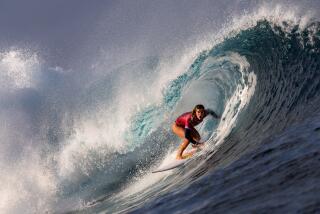In Post-Neon Era, Surfwear Shops Stay Afloat by Unloading Frills
This summer Orange County’s surfwear manufacturers are hoping their latest beach styles will spread across the country like a massive wave.
Some are worried. After a couple of years of flat sales that have seen many surfwear companies and shops struggle and go under, the question remains: Is there life after neon?
“We’re trying to find our niche,” says Tom Noble, co-owner of Newport Surf & Sport in Newport Beach. “We hit our peak a couple of years back when beachwear went mainstream. Now we have a little bit of an identity crisis.”
As their fluorescent shorts and shirts became big sellers in malls across the country, some surfwear designers strayed too far from the beach.
“We were selling to guys in Kansas instead of surfers,” complains Andy Thies, a sales clerk at Laguna Surf & Sport in Laguna Beach.
With its long stretch of coastline, Orange County is the capital of the surfwear market. Every major company is here, including Ocean Pacific, Gotcha, Quiksilver and Stussy. Trends are made or broken on the county’s shores.
“From Huntington Beach to Laguna Beach, what happens on those beaches during Easter week determines what everyone will be wearing for the rest of the summer,” Noble says.
Those companies that rode the neon tide to prosperity have now taken a 180-degree turn away from acidic colors.
Two years ago the racks of Laguna Surf & Sport were filled with blindingly bright trunks and shorts. Today all of the clothes are dark, as if someone pulled the plug on the electric shades.
“Neon is dead. Except for the tourist market and as accents on black, it’s still deader than dead,” says Eric John, owner of Laguna Surf & Sport.
Designers have rebelled against neon by creating shorts, swim trunks and T-shirts in dark jewel or earth tones. Deep olives, purples and black are predominant colors.
Some in the industry think the pendulum has swung too far toward the darker palette.
“We do a lot of tourist business. That guy from Iowa won’t understand olive board shorts. He’s going to the beach, not a funeral,” Noble says.
“In sportswear everything went dark, but the bottom line is people want color when they go to the beach--not neon, but fun colors like royal blue and reds. And there’s been a big void in color.”
Designers also have been experimenting with new fabrics. Woven knits, corduroy and printed denim have edged out nylon as the fabric of choice for beachwear.
“Kids want more textured fabrics,” Noble says. “We’re doing really well with fabrics you wouldn’t think would be beachwear fabrics. Come on, flannel shorts for summer?”
Flannel has proved an unlikely hit for Pirate Surf in Costa Mesa, a year-old company owned by Quiksilver.
“I wanted to take something from the past and reintroduce it with a slight twist,” says Jeff Yokoyama, the designer for Pirate Surf.
So he acid-washed plaid flannel to give it the well-worn, nubby texture of old pajamas. He’s used flannel for short- and long-sleeved shirts, shorts and elastic-waist pants. They’re available at Laguna Surf & Sport for about $35 to $50.
Yokoyama represents a new breed of beachwear designers rebelling against the mainstream and returning to their roots: surfing.
“I surf every day, and there’s a lot of rawness to that,” Yokoyama says. “Real surfers aren’t all glamour. They make do with what they have. I get a lot of inspiration from the beach.”
To maintain its competitive edge on the beach, Gotcha started up its More Core Division aimed at more hard-core surfers. The Irvine-based company has introduced a line of simple tank tops and T-shirts in dark solids or printed with its biker-like logo.
“We don’t need to put a lot of junk on T-shirts,” says Shaheen Sadeghi, executive vice president of merchandising and design for Gotcha. “We’re returning to simplicity. Basically, swimwear will go back to being a core product. You won’t see people walking around the malls in their swimwear as they did with neon.”
Some designers establish their own identities in an industry notorious for copy cats by creating unusual prints.
Shawn Stussy, whose keen design instincts have kept the Irvine-based Stussy Inc. on top, has introduced a line of yarn-dyed knit T-shirts with woven prints that give the garments a kind of retro look. Laguna Surf & Sport has his black- and berry-colored knit T-shirt with an abstract woven print for $35.
Jack Denny, designer and co-owner of World Jungle in Laguna Beach, has introduced a promising new line of clothes with Bali-inspired prints.
“People were looking for new labels, and I had a lot of ideas,” Denny says.
His trunks, shorts and shirts come in what he calls “heavy metal Hindu” prints. They’re inspired by his trip to Indonesia and by heavy metal logos and album covers.
While most manufacturers still use their own logos on T-shirts, they’ve stopped plastering them all over trunks and shorts like ads on a race car.
“We’re less reliant on the logo to drive us and focusing more on the product,” says Gotcha’s Sadeghi.
Where before a company’s name would be emblazoned across the shorts, now only a tiny patch with the logo appears.
“You don’t need a billboard on you,” Thies says. He holds up a pair of black shorts with Billabong printed down the side in massive orange letters.
“This is for the tourist kind of guy.”
More to Read
Sign up for Essential California
The most important California stories and recommendations in your inbox every morning.
You may occasionally receive promotional content from the Los Angeles Times.









